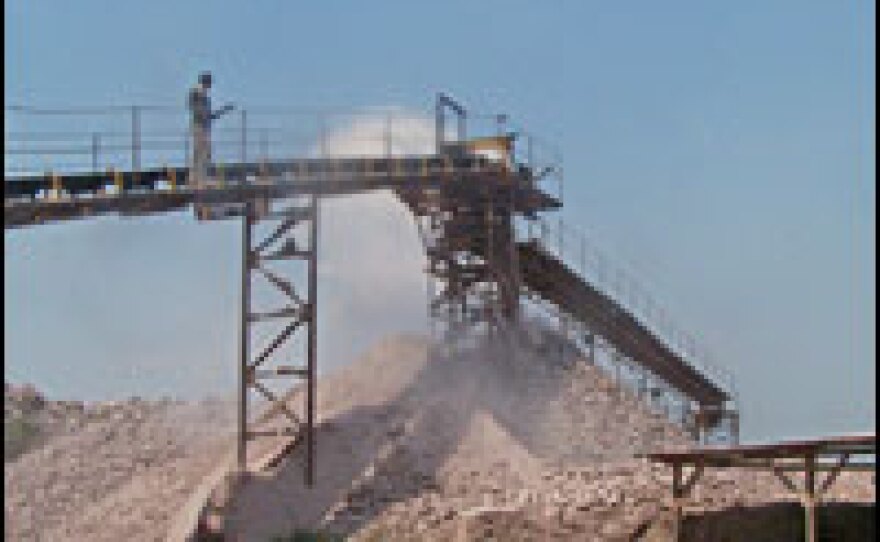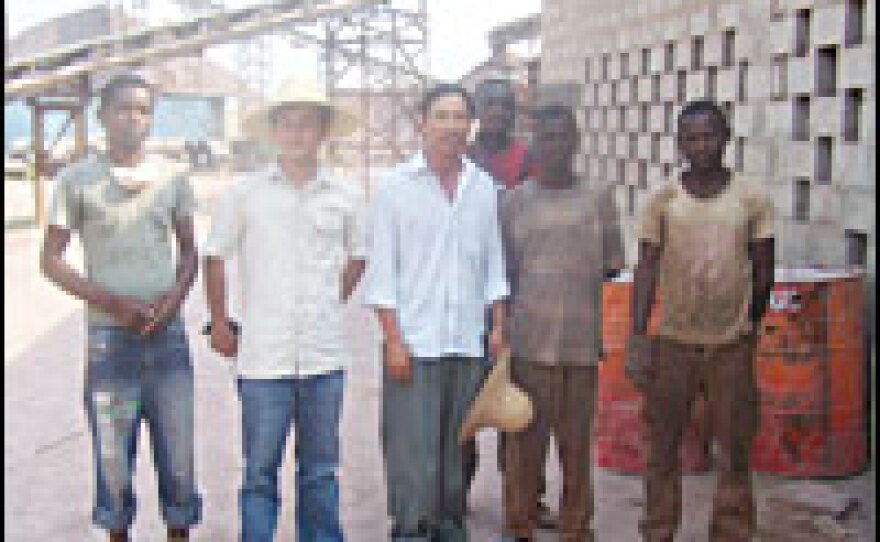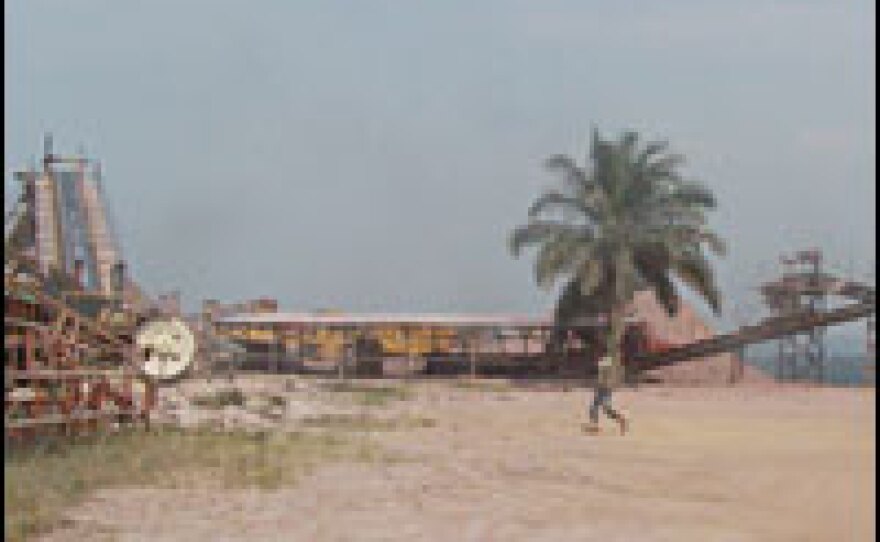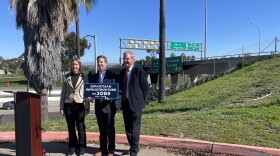

For more than two centuries, foreigners have been chasing after Africa's abundant natural resources. These days, the country most eagerly pursuing the continent's oil, minerals, and timber is China.
Critics say China is behaving like the imperialist powers of old, but many African leaders are welcoming Chinese trade and investment. A good example is the Republic of Congo, sometimes called Congo-Brazzaville.
Congo's New Development Partner
Just outside Congo's capital, Brazzaville—alongside a dusty road and down the street from an open-air market—a sleek, new building has gone up. The front is all glass panels and concrete pillars. It's the new headquarters of Brazzaville's radio and television network and was actually built by a Chinese company. China is also building the new foreign ministry and a massive hydroelectric dam about 130 miles north of Brazzaville, providing cut-rate financing for its construction projects. Eighty-five percent of the money for the new dam comes from China — at far below market rates.
To some extent, China is replacing the World Bank and other Western donors as Congo's new development partner—-with a new emphasis. The World Bank mostly supports education and health programs and conditions its aid on Congo showing more transparency in its government. China, on the other hand, provides its aid without conditions, and it focuses on building dams, soccer stadiums, hospitals and roads.
Serge Mombouli, a longtime adviser to Congo's president, says the West pushes for intangible achievements like better government, while China supports tangible things.
"Tangible development means you can see, you can touch," Mombouli says. "We need both. We cannot be talking just about democracy, transparency, good governance. At the end of the day the population does not have anything to eat, does not have water to drink, no electricity at night, industry to provide work, so we need both. People do not eat democracy."
Expanding Trade
But China's assistance with these low-cost building projects comes as part of a package deal. In return, China gets first crack at Congo's natural resources, like oil. China now gets half the country's annual oil production and also imports Congo's other big natural resource—timber. Each day, trucks bearing huge logs from Congo's virgin forests roll south toward ports. The timber is bound for China.
To the alarm of environmentalists, China has locked up long-term timber concessions from Congo without securing safeguards against deforestation.
Peter Navarro, a business professor at the University of California-Irvine, points out that China is developing largely through its heavy manufacturing sector and is looking to Africa for the natural resources it needs.
"As the Chinese economy expands in that direction, as they move into building automobiles and aircraft, they're going to need incredible amounts of these raw materials, whether it's timber, copper, precious metals, or whatever. And there are only certain places you can go. I mean, Africa represents to them their source of fuel for their economic engine." Navarro says.
According to Chinese government figures, trade between Africa and China last year surpassed $55 billion, up 40 percent over the previous year.
The New Imperialists?
China's relentless exploitation of Africa's natural resources is reminiscent of the colonization of the continent by European powers in the 19th century. Navarro, who wrote The Coming China Wars, says that by bartering roads, power plants, presidential palaces for oil and timber concessions, China supports corrupt regimes and deprives future generations in Africa of the opportunity to develop wisely.
"China goes in, builds the infrastructure, uses that country's infrastructure to extract their resources, takes those resources back to China, builds finished goods, then ships them back into that country to sell," Navarro says. "It's a closed imperialistic loop, and the bottom line is poverty instead of prosperity in countries that have incredible natural wealth."
China, however, makes its deals with sovereign and independent African states — a point made by Liu Guijin, the top Africa specialist in China's diplomatic corps. In a recent interview with the South African Broadcasting Corporation, Liu rejected the notion that China's activities in Africa today are anything like what European imperialists did there.
"Our way of doing things in Africa is not like the old colonialists. They send troops. They occupy the minerals. They grab them without paying anything or paying very small," Liu says. "But for China, we are coming here to buy your minerals. We are coming here to have joint ventures to explore your minerals. We are doing that through friendly and equal consultations."
In the 1960s under Chairman Mao Zedong, China lavished aid on the newly independent African governments out of political solidarity. This time China is in Africa for economic reasons.
Serge Mombouli, now the Congolese ambassador to the United States, sees no reason the Chinese should apologize for what they're doing in Africa today.
"They are business people. They are not charity organization. They are coming for business. And any contract that the Chinese sign with African country, those are contracts that are negotiated," he says.
In Congo, the big Chinese project is the construction of the new dam. It will take a lot of concrete, and the aggregate to make the concrete is coming from a quarry just outside Brazzaville. Big chunks of rock are blasted out of the earth, then ground up into little pieces.
The quarry is run by CMEC, the China Machinery and Equipment Corporation. About a dozen Chinese technicians direct the operation, assisted by about 70 Congolese laborers. The Chinese foreman at the quarry, who declines to give his name, says Congo is an awfully hot place to work. He and the other Chinese workers all wear big straw hats, but he's not complaining.
"We're used to adjusting to new environments," the foreman says. He and his Chinese colleagues have also done quarry work in Malaysia. "Besides, the Congolese are our brothers, our friends. We enjoy working with them."
The Congolese laborers here, however, have a somewhat different story. Several workers say they are paid only 35 cents an hour for back-breaking, dangerous work.
China's operations in Congo are not open to scrutiny. The latest economic cooperation agreement between the two countries is just two pages long, and it's written in general terms.
Brice Mackosso, an anti-corruption activist in Congo, wants to know how exactly China is paying for its oil and timber and how the Congolese leaders are making use of the China trade.
"In this situation, it doesn't really benefit us," Mackosso says. "For it really to be cooperation, it has to benefit the people of Congo and not just the people of China."
Last year, World Bank President Paul Wolfowitz almost dropped Congo from an important debt-relief program because he did not think it was doing enough to fight corruption. It appeared that Congo might be ready to work exclusively with China and turn its back on Western aid, but Information Minister Alain Akouala insists Congo needs international institutions to help promote good governance.
Copyright 2022 NPR. To see more, visit https://www.npr.org. 9(MDAzMjM2NDYzMDEyMzc1Njk5NjAxNzY3OQ001))







